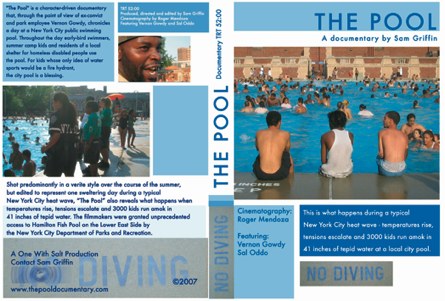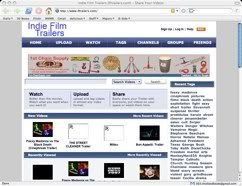Director Mike Dorsey (Dearly Departed, Vol 1) posted this message to the WAB message boards and I just had to reprint it here (with permission). It's an amazing peek into the other side of the world of (some) producer's reps.
I worked for a Producer's Rep as a sales director for about 8 or 9 months a while back. It was an eye-opening experience and I have decided to write about it here so that any of you considering signing with a producer's rep will know of the potential pitfalls.
1. The producer's rep that I worked for was a lawyer, as many producer's reps are. The upside: it gives them the power to handle all negotiations and contracts. The downside: they're greedy lawyers who will utilize every loophole in the book, and take advantage of the "legally ignorant" artists they represent, at every opportunity.
2. The producer's rep that I worked for usually tried to get a "retainer fee" out of clients up front before he would sign them. As a lawyer, this is perfectly normal. As a rep, it was usually robbery. From the rep's point of view, he's covering his *** because the odds of getting a distribution deal for an indy film are slim, and therefore the odds of him seeing a profit down the line are also slim. He doesn't want to work for nothing, so he needs to at least get some money up front to make it worth his while.
I saw many filmmakers get taken advantage of with this "retainer fee." We would screen a film, say to ourselves "no way this gets sold" and he'd tell us to try to get a retainer fee out of them anyway, knowing full well he'd never be able to sell the film, short of a miracle. It's just a way for him to grab an extra three or four grand that month. Half the time the overexcited producers with stars in their eyes would fork over the cash, thrilled that anyone was even paying attention to them. The answer to this is that if he REALLY wants your film and REALLY thinks it will sell, you will be able to either negotiate this fee down or even bypass it altogether. If he won't budge, pass.
3. Once we had a film: This rep had about 40 films on his shelves at any given time. That is an INSANE amount of films to be juggling for an office with only TWO salesmen. Basically, only 5-10 films were really getting actively promoted while the others sat on the shelves until their producers called up and demanded a progress report. When that happened, we'd get on the phone with all of the distribution companies, who had probably been sent the film 6 months ago and completely forgotten about it. If a film hasn't sold within the first year, it's pretty much shoved to the back burner until the contract expires. For this reason I don't recommend signing any contract that goes beyond 18 months. If they haven't sold it by then, it isn't happening and it's time for you to try something else.
In addition, the massive amount of films meant we weren't very selective, which means we had a pretty terrible reputation with most of the bigger distributors because we were always sending them total crap. Some distributors wouldn't even look at our films anymore. Is that what you want from your rep?
One solution to this issue is to be the squeaky wheel. Be the producer who calls your rep's office twice a week to see how things are going. Your contract with them will probably have a schedule for receiving progress reports listing who they've sent the film to and what the response has been. Make them stick to this schedule.
4. Some distributors are either shady or bottom rung, and the filmmakers usually don't know the difference. These distributors would "buy up" six of our films in one giant group, with no money up front and everything deferred. It was usually a backroom deal where we'd sell them a film they really wanted but they had to "buy" a few others as part of the deal. We would then turn around and try to convince the producers/filmmakers of these other films that it was a good deal and that they should take it. Of course, most of those films would never see daylight, but it got them off of our backs.
5. Upfront money: You probably already know that a deal that offers nothing up front and everything deferred is almost certainly never going to pay you anything. A "no money upfront" deal should send up the same red flags as a rep demanding a retainer fee. If the distribution company really thinks they can make money off of your film, they'll pay you something upfront.
6. Deferred payment: Why deferred payment deals will rarely pay you any money.-- you know this, but it's because of that great clause that says you get your percentage of profits after the distribution company recoups all marketing and other costs. A lot of distributors will lie through their teeth about their costs to keep from paying you. If the film makes $100,000, they'll tell you they spent $100,001 on the packaging and marketing. Then you have to audit them and it's a mess. Do you think your lawyer is going to help? Well, you're fighting to get a few dollars out of your distributor, and your rep only gets 10-15% of that. Worth his time? Probably not.
7. Your producer's rep is not always on your side. Consider that he's known you for a few weeks, and you're a one-shot deal. He's known the distribution companies for YEARS, and has sold to them before and will continue selling to them. Whose relationship do you think he values most? He will sell you out to maintain his relationships with them EVERY TIME.
RECOMMENDATIONS:
I don't like to point out problems without offering solutions, so here's my advice:
1. Not all producer's reps are evil, and even the evil ones will do something good occasionally. If they were nothing but scam artists they wouldn't be in business because distribution companies would never accept their submissions.
2. If a producer's rep calls you up and asks for a screener, it means one of his assistants probably found your name on a list of films accepted to festivals and is simply feeling things out. Before you send them anything, ask them how many films they represent. If it's more than 20, or if they won't give you an answer, they probably aren't going to give your film much attention. They just want your money.
3. If they ask for a retainer, tell them you're already fielding calls from other reps, you have a buddy who's got an "in" at a mid-level distributor, and you'll have to get back to them. Let a week pass and then call them up saying you can't justify paying a fee right now, and see if they counter. They know you're a poor indy filmmaker with no money, so if all else fails and you can't negotiate their fee down, play the "I have no money card" and tell them how much you can pay if you scrape together some favors. Odds are they'll go for it. If they don't budge, you'd be wasting your money anyway because they obviously don't think the film is worth their risk. If they won't risk anything, why should you?
4. Do your homework. Find out which distributors are good and which ones are crap, so that when you're rep comes to you with a deal at one of the crap ones, you can tell him you want to wait for something better (he can't force you to sign a deal). If you sign with a crap company, you're basically putting your film on ice for at least 3 years. If you think selling it now is hard, just wait until it's 3 years out of date.
5. Finally, it's possible that your film just isn't marketable. It was a lot of fun to make, you learned a lot, and most of the time that's all it is. If you're relying on a producer's rep you've never heard of to sell your film, chances are distribution was more of an afterthought for you anyway. Take the money you would have wasted on hiring a rep and put it into the budget on your NEXT movie.
Sorry if some of this is common knowledge -- just wanted to cover all of the bases. Best of luck to you guys. As a filmmaker myself, I couldn't stomach working at that place and got out of there as soon as another opportunity came around.
Mike Dorsey directed Dearly Departed, Vol. 1 and operates Movie Threadz - clever shirts and gifts for movie fans, filmmakers, writers and actors.If you have a positive producer's rep experience to share, I'm looking for you. E-mail me at chris@stomptokyo.com.

 A few months ago while wandering the internet in search of indie-film related advice (let's call it pre-pre-research for FFS), I came across a blog entry that suggested filmmakers eschew building their own web sites and use MySpace as their primary internet presence. (Many apologies to the author of the piece, whose blog escapes me at the moment -- I'll be sure to link if I stumble upon it again.) I can't help but respectfully disagree. A well-built web site is one of the most powerful marketing tools an indie filmmaker can possess. A mere MySpace page is no substitute. Here's why:
A few months ago while wandering the internet in search of indie-film related advice (let's call it pre-pre-research for FFS), I came across a blog entry that suggested filmmakers eschew building their own web sites and use MySpace as their primary internet presence. (Many apologies to the author of the piece, whose blog escapes me at the moment -- I'll be sure to link if I stumble upon it again.) I can't help but respectfully disagree. A well-built web site is one of the most powerful marketing tools an indie filmmaker can possess. A mere MySpace page is no substitute. Here's why:


 Chris Holland has been writing about movies since 1991. In 1996 he co-founded
Chris Holland has been writing about movies since 1991. In 1996 he co-founded 